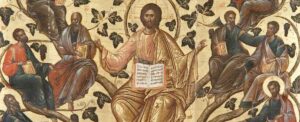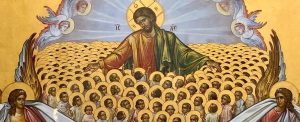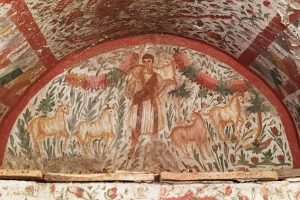Ephesians 2:4-10 • Luke 8:41-56
Glory to God the Father, the Son, and the Holy Spirit.
At the beginning of creation, in the book of Genesis chapter 1, the divine persons of the Trinity say to one another “Let us create man in our image and likeness, and give him dominion over all things.” And so in chapter 2, the Lord God forms man out of the dust of the earth and breathes into him the breath of life, and men becomes a living soul: Alive because he is sustained by God, the source and wellspring of life.
You know, if you ask a fish, “How is the water”? he’ll answer you: “What is water?” Water is his whole world. It’s all he knows. If you ask Adam, in Paradise, “What is it like to live in a garden of delight, walking with God without a single care?” Adam might answer, “I don’t know what you mean. This is my world and it’s great!”
The Lord gives man one command: “Of the tree of the knowledge of good and evil, thou shalt not eat of it: for in the day that thou eatest thereof thou shalt surely die.”
The experiential knowledge of good and evil, of blessing and suffering – don’t make that your experience, Adam.
This is not a threat or a test. It’s a warning. When you are baking, you tell your little child, “Don’t touch the oven! Hot! It’ll burn you.” Don’t make the experience of both blessing and suffering a part of yourself; it will cause death in you. “In the day that thou eatest thereof thou shalt surely die.”
And Adam eats the fruit of the tree, and dies. And then goes on walking around having children for another 900 years.
He has acquired a condition we call death.
If you make a mold to stamp out copies of a piece of art, it can replicate that sculpture endlessly. But sin and death have cracked the mold, and now Adam stamps out damaged copies. Mankind is still made in the image of God – but the likeness has been damaged.
As long as your mobile phone or flashlight is plugged into a power source it remains bright and functions properly. When you unplug it from its source, it runs for a little while but then it begins to grow dim. Your phone stops being able to make and receive calls, and finally it flickers out altogether.
In the Old Testament law, for some very grave sins and crimes the punishment is said to be “He shall be cut off from his people.” This can mean exile but it often is a euphemism for death. So in the gospels we see several times where our Lord begins to reveal that he and his Father are one, and the people pick up stones to stone him to death.
Death is the divider. Death cuts off our relationships. Our loved ones are in the hands of God, but they are cut off from us. Death is separation. Adam, acquiring the condition of death, has died to God. He has been cut off, alienated, separated from the source of his life – and so the human race begins to perish.
This morning we heard from Saint Paul’s epistle to the Ephesians. Chapter 2 begins: “As for you, you were dead in your transgressions and sins, in which you used to live when you followed the ways of this world… But because of his great love for us, God who is rich in mercy, made us alive together with Christ even when we were dead in transgressions.”
This verse contains my favorite Greek word: synezōopoíēsen. It’s found here in Ephesians, and again in Colossians 2:13. It means “made-alive-together-with.” All that in one word! Paul says, when we were dead, God has made us alive with the life of Christ.
When Christ, who is our life, united himself to humanity in the Virgin’s womb, then out of death, humanity was restored to life. Human nature, which was perishing apart from God, was made to drink from the fountain of life. We who were dead were made alive with the life of Christ.
There’s a book for Bible translators that warns against rendering “eternal life” as something like “life without end,” or “everlasting existence.” Because what the Gospel writers actually said was “the Life of Eternity” – the life of the age to come. Everybody will already exist unto ages of ages in some state or place; but those who are in Christ, and bear fruit, participate in the nature and life of the holy Trinity. If you go back and read through St John’s three short letters in the back of your Bible, see how many times he says, “I write these things to you who believe in the name of the Son of God so that you may know that you have eternal life” (1 John 5:13). You have the life of eternity.
The Lord teaches about this in the Gospel of John chapter 15 when he says, “I am the vine, you are the branches… If you abide in me and I in you, you will bear much fruit; apart from me you can do nothing. If you remain in me and my words remain in you, ask whatever you wish, and it will be done for you. This is to my Father’s glory, that you bear much fruit, showing yourselves to be my disciples.”
Now, we live in wine country, so you may already know this, but: Some grapes that taste delicious grow on weak vines. So growers plant vines that are strong and then they graft into them branches that bear the best grapes. So the same life and power that is in the strong vine flows in these branches and enables them to thrive and bear good fruit, as long as they remain united to the vine.
The life that is in the vine is in the branch. The resurrection life of God that is in Christ is in you – to one degree or another. Some bear fruit thirtyfold, some sixty, and some a hundred (Mark 4:20).
Saint Paul writes: “You have become a partaker of the root and richness of the tree…” but, regarding the unbelieving Jews, “You may say then, ‘Branches were broken off that I might be grafted in.’ This is true. It is faithlessness that broke them off, and you stand by faithfulness.” (Romans 11:16-24).
We see this overcoming life and power of Christ in action in today’s Gospel reading. In the midst of a crowd, the Lord stops and asks, “Who touched me? …I could tell power went out from me.” Now when the woman saw that she was not hidden, she came trembling; and falling down before him, she declared to him in the presence of all the people the reason she had touched him and how she was healed immediately.
She came trembling — why? Because under the Jewish law, a person who touched blood or a dead body was separated, and anyone who touched them was made unclean as well. That meant a Jewish woman on her monthly period, or immediately after giving birth, couldn’t enter anyone else’s home, or the Temple, and anyone or anything she touched shared her separation. And this woman had been suffering from an issue of blood for twelve straight years.
Now, to be clear, Jewish ritual impurity is not sin (how could anyone repent from what a healthy woman’s body does every month?) but under the Jewish law, ritual impurity visibly separated a person from their family and from shared worship. And as long as this woman had this condition, anybody that this woman touched would contract a state of ritual impurity from her.
This woman is right to be afraid. If the crowd that’s been pressing against one another realize that she has just made many of them unclean by touching her, how angry are they going to be? And she’s not just bumped into however many people in the crowd, but she’s just publicly touched the Teacher Jesus. What is he going to say!?
But the Lord turns the tables on expectations. The touch of the woman doesn’t make him impure: Instead, He makes her clean.
He does the same thing in another passage (Matthew 8:3) when he touches a leper. Lepers were commanded to live outside the camp, and aways call out “Unclean! Unclean!” so no one would come near them and catch their disease or their ritual impurity (Leviticus 13:44-46). But when the Lord touches a leper, the leper does not make him sick or unclean: The Life of God makes the leper clean and whole.
And when people were coming to John the Baptist to repent and wash their sins away, the Lord came with them. John was confused, because the “Lamb of God who takes away the sins of the world” (John 1:29) has no sins to wash away: “I need to be baptized by you! How are you coming to me?” (Matthew 3:14). But he obeys, and immerses the Creator of the world in the water. When the sinless God incarnate enters the muddy Jordan river, it doesn’t make him clean: He makes the waters pure and holy.
Jesus doesn’t get wet — the water gets Jesus.
The action of God in the world, in things and people, is what we call Grace. In the New Testament, whenever you see the word grace you can usually expand it with “What God Does.” So in today’s epistle St. Paul writes, “It is by grace – by the action of God – that you have been saved. He has raised us up together, and seated us together with him in the heavenly places in Christ Jesus, so that in the ages to come, he might show the exceeding riches of his grace in his kindness toward us in Christ Jesus.” That tells me that God is not done with us yet! Our Lord delights to pour out his mercy and his goodness and his power on us.
Saint Paul goes on, “By grace – by the personal action of God – you have been saved, through faithfulness. And even that [faithfulness] is not from yourselves, it is the gift of God, not of works, lest anyone should boast. For we are his workmanship, created in Christ Jesus for good works, which God prepared beforehand that we should walk in them.”
And he advises the church at Philippi, to “work out your own salvation with fear and trembling; for it is God who works in you both to will and to do for His good pleasure” (Philippians 2:12-13).
Did you catch that? The desire to do good comes from God in the first place. The action of doing good is also God at work in in you.
“I have been crucified with Christ, and I no longer live, but Christ lives in me. The life I now live in the body, I live by faith in the Son of God, who loved me and gave himself for me” (Galatians 2:20).
This is what the Fathers call synergy: Cooperation; working together. God started everything, by calling you when you were still his enemy. It was grace – God in action – that made you able to hear and respond to his call. It’s grace that will help you save you and keep you in him. All we can supply is intention, trust, and perseverance.
If anyone be in Christ, he is a new creation: Old things have passed away; all things are made new (2 Corinthians 5:17). Well, now what? Here is Saint Paul’s answer:
Therefore, since you have been raised with Christ, set your hearts on things above, where Christ is, seated at the right hand of God. Set your minds on things above, not on earthly things. For you died, and your life is now hidden with Christ in God. When Christ, who is our life, appears, then you also will appear with him in glory.
Therefore put to death what is earthly in you: sexual immorality, impurity, lust, evil desires and greed, which is idolatry. Because of these, the wrath of God is coming on those who are disobedient. You used to walk in these ways, in the life you once lived. But now you must also rid yourselves of all such things as anger, rage, malice, slander, and filthy language from your lips. Do not lie to each other, since you have taken off your old self with its practices and have put on the new man, which is being renewed in knowledge in the image of its Creator…
Therefore, as the elect of God, holy and beloved, clothe yourselves with compassion, kindness, humility, gentleness and patience. Bear with each other and forgive one another if any of you has a grievance against someone. Forgive as the Lord forgave you. And over all these things put on love, which is the bond of perfection. And let the peace of God rule in your hearts, to which also you were called in one body; and be thankful. Let the word of Christ dwell in you richly in all wisdom, teaching and admonishing one another in psalms and hymns and spiritual songs, singing with grace in your hearts to the Lord. And whatever you do in word or deed, do all in the name of the Lord Jesus, giving thanks to God the Father through Him (Colossians 3:1-17).
To the glory of God the Father, the Son, and the Holy Spirit.






